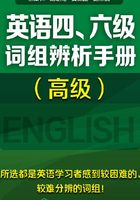
5 absorb in; apply [bend; give; put; set; turn] one’s mind to; apply oneself to; attend to; bury (oneself) in; devote (oneself) to; settle down (to); soak (oneself) in; steep (oneself) in
● 本组词组均有“专心于” “全神贯注于” “埋头于”之意,一般可互换。
● absorb in后接名词或ing分词,多以ed分词作表语、补语或状语等。如:He was too absorbed in his newspaper to hear the doorbell.(他专心读报,连门铃声也没听见。)I was totally absorbed in what I was doing.(我完全专注于我做的事情。)I found him absorbed in writing a report when I called on him.(我拜访他时,发现他正在专心写一份报告。)She was absorbed in thought.(她陷入了沉思。)
● apply one’s mind to意为“专心于” “致力于”,apply常用bend, give, put, set, turn替换。词组中的to后多接事物名词,词组中的mind须与主语保持数的一致,如果用被动语态,通常将mind提前做主语。如:You are sure to succeed if you apply [bend; give; put; set; turn] your mind to it.(只要你专心去做这件事,你一定会成功。)He could not set his mind to his work that afternoon.(那天下午,他无法把精神灌注于他的工作上。)I’m sure we can get it all sorted out if we bend our minds to it.(我相信如果我们专心致力于这件事,就能把它全部整理出来。)He’d do well in the exams if only his mind was put to his studies.(只要他专心学习,就能够在考试中获得优良成绩。)
● apply oneself to和apply [bend; give; put; set; turn] one’s mind to意思一样,区别是:一般不用被动形式,to之后有时也接ing分词。如:Had she applied herself as enthusiastically to work as to pleasure she might have been very successful.(假如她对工作像对娱乐那样专注热心,也许她早成功了。)He applied himself to learning Spanish.(他专心学习西班牙语。)She could not entirely apply herself to the arrangements for her own wedding.(她不能全力以赴安排自己的婚礼。)His sister applied herself to American history.(他姐姐致力于研究美国历史。)
● attend to意为专心于某事或专心干某事,后接分词或ing分词,少用被动形式。如:We should attend better to our studies.(我们应该更专心于学习。)Let’s attend to our work instead of talking.(让我们专心于我们的工作,而不是空谈。)He did attend the lecture this morning, but somehow he did not seem to attend to it.(今天上午他的确去听讲座了,但不知怎么他似乎心不在焉。)You won’t succeed unless you attend to your work.(除非你专心工作,否则不会成功。)
● bury (oneself) in意为“专心于” “埋头于”,多用于较正式文体,in后多接事物,可用被动语态。如:Don’t disturb your mother: she’s buried in the crossword.(别打扰你母亲,她正聚精会神地玩纵横填字游戏。)He buried himself away in the country to write a book.(他隐居到乡下去写书。)In the evenings she buried herself in her books.(每天晚上,她都埋头读书。)I shall have to bury myself in my studies if I am to pass the exam.(我要想通过考试,就得专心学习。)
● devote (oneself) to意为“专心于” “致力于”,可用被动语态,在本组词组中最常用。如:He has always devoted himself to his music.(他一向专心研究音乐。)They were devoted to the study of new weapons.(他们专心致力于研究新武器。)She devoted herself to her invalid child.(她把自己的全部身心都倾注到她的病儿身上。)Her entire life was devoted to learning.(她一生致力于做学问。)
● settle down (to)意为“专心于”某事或做某事,一般不用被动形式,后接名词或ing分词等。如:It’s terrible—I can’t settle down to anything today.(真糟—我今天无法安心做任何事。)After trying various pursuits, he has settled down to farming.(在尝试过多种职业之后,他已安心从事农业了。)He settled down to correcting the exercises.(他安下心来批改作业。)I must settle down this morning and do the cleaning.(我今天上午必须专心致志地做清洁工作。)
● soak (oneself) in和steep (oneself) in两者都意为“专心于”“埋头于”某事物,多用于书面语,可用被动形式。如:Only by soaking yourself in the details can you gain a thorough understanding of the subject.(你只有认真钻研各项细节,才能对问题有彻底的认识。)During these long summer visits, he had soaked himself in the traditions and customs of the place.(在这几次长时间的夏季参观访问中,他都在专心调查这个地方的风俗习惯。)My teacher steeped himself in the literature of ancient Greece and Rome.(我的老师精通古希腊和古罗马文学。)I have a talk to give on the famous writer next month, so first I must soak [steep] myself in his books.(下个月我要作一次有关这位著名作家的报告,因此,我必须首先要专心研究他写的那些书。)She is a scholar steeped in the art of the past.(她是一个对古老艺术造诣很深的学者。)